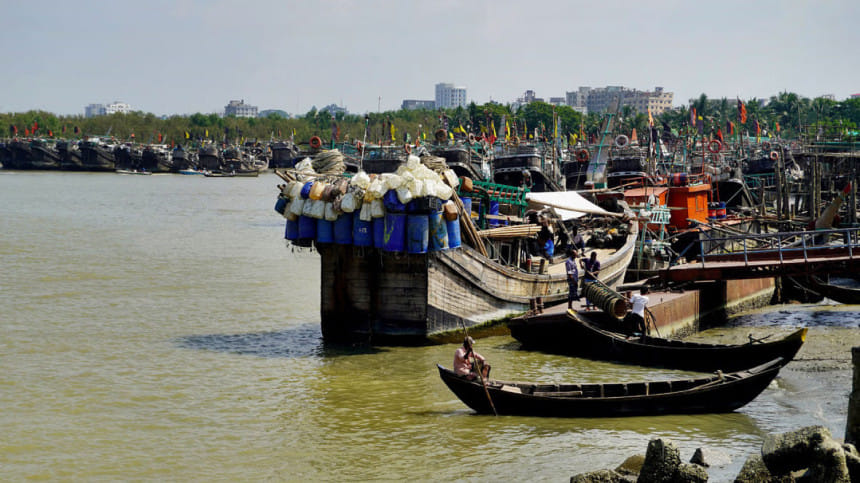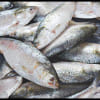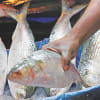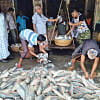Time to rethink fishing ban

Recently, a TV news report highlighted the suffering of a fisherman's family even during Eid-ul-Azha. Among the three main reasons stated in the report, the fishing ban imposed by the government as well as a lack of government support during the ban period were mentioned. This is not breaking news; similar reports have surfaced frequently in the past. For instance, consider the report titled "No Eid joy for 10,000 fisher families in Dashmina" published on June 14 last year. The report mentioned that Patuakhali's Dashmina upazila was home to around 150,000 people, a significant number of whom relied solely on fishing to earn their living. However, due to a long-standing ban on fishing in the sea, these fisher families faced extreme hardship, barely managing two meals a day. As Eid-ul-Azha approached, most families could not afford even a piece of meat for their children. With heavy hearts and empty hands, the fishers of that region endured their days.
The 58-day ban on marine fishing imposed in Bangladesh from April 15 till June 11 this year was intended to ensure sustainable management of fish stocks and marine biodiversity. This year, the government imposed a shorter ban than usual and synchronised it with the Indian ban—a step that has been well-received by conservationists and coastal communities alike.
Such an alignment was important. Previously, the difference in timing between the fishing ban by Bangladesh and India allowed Indian fishermen to fish in Bangladeshi waters while local fishermen remained at home and complied with their country's law. With the fishing ban now aligned, Bangladesh has taken a step towards protecting its marine resources from cross-border exploitation.
Fisheries are a stronghold of Bangladesh's economy, contributing nearly 3.5 percent to the overall GDP and 25.72 percent to the agricultural GDP. Bangladesh stands third in the world in inland fish production, contributing 86 percent of the global hilsa catch, an iconic fish species closely linked to the country's culture and economy. The fisheries sector in Bangladesh provides livelihoods for approximately 1.8 crore people, among whom about 17 lakh are registered. Exports of fish and fish products brought in $422.28 million for Bangladesh in FY23 and $532.94 million in FY22. Yet, these economic benefits hardly reach small-scale artisanal fishers who are the backbone of the sector.
From an ecological viewpoint, the importance of the fishing ban cannot be stressed enough. Studies on its impact have found it effective in terms of increased total production of hilsa after the ban periods. A study published in the Dhaka University Journal of Biological Sciences observed that during the marine fishing ban, the average length and weight of hilsa fish in Bangladesh increased significantly compared to periods outside the ban. These findings suggest that the fishing ban has a positive impact on the growth and size of hilsa, contributing to improved fish stocks. Notably, fish catches tend to increase following the ban period; as recently highlighted by Fisheries and Livestock Adviser Farida Akhter, the long ban has led to a record 12.78 percent increase in marine fishery resources, thereby confirming the effectiveness of such conservation measures.
Unfortunately, though this conservation effort stands triumphantly for the marine biodiversity of the nation, it takes a heavy toll on the lives and livelihoods of fisherfolk in coastal Bangladesh, presenting an almost entirely ignored humanitarian crisis. In Bhola district alone, there are now more than 65,000 registered sea-going fishers who faced total unemployment with no other source of income during the ban. According to a survey conducted by COAST Foundation in 2024, 79.9 percent of families who survive the ban period end up taking loans at high interest, mostly from local moneylenders or microfinance institutions.
The impact of the fishing ban, especially how it is now being executed, affects the lives of coastal fishers' families in two key ways. First, as very few members of the fisher community have alternative sources of income, when fishing is prohibited, their only means of income is cut off. As government support, each fisher family is allocated 40 kilograms of rice per month. But can a family of four to five members survive on just rice? Their needs for healthcare, education, and other daily essentials cannot be adequately met with this assistance. Moreover, this support is not always delivered on time.
Second, though food support is available during the ban, this support scheme has not shown any improvement in the delivery system. There are two problems here: complexity and issues in the registration process. Many eligible fishers remain unregistered, while there are complaints that individuals who are not actual fishers have managed to get registered under the national fishermen ID card project. For example, in Cox's Bazar, the number of government-registered fishers is about 63,193, while the actual number is around 100,000. In Patuakhali, another example, the number of fishers is at least 150,000, but only 75,000 names appear on the registration list. Those who remain outside the registration system are also prohibited from fishing, meaning their only source of income is shut down.
The fishing ban is an important measure for the conservation of marine fishery resources and sustainable harvesting. But if there are no widespread alternative livelihood or income generation options for the affected fishermen's families, the success of the initiative will be called into question, and that question will undoubtedly carry a negative connotation. Therefore, financial and technical support for fisher families to develop at least one alternative income source is essential. Special training programmes for the women of these families could be an effective option in this regard.
There is little doubt that providing cash assistance instead of rice would be more effective in this context. Nowadays, with mobile banking, such financial aid can be easily delivered directly to the fishers. Government assistance must reach all fishers. It is also crucial to ensure that fishers can access loans from institutional sources on easy terms during the ban. In the absence of such institutional support, coastal fishers are often forced to borrow from moneylenders under exploitative conditions, such as dadon. At times, they even have to sell their labour in advance.
Conservation cannot come at the expense of human dignity and survival. Fisherfolk, those who risk their lives at sea and contribute so much to the nation's economy and food security, deserve better.
It is paramount that immediate action be taken by policymakers to mitigate the aforementioned humanitarian impacts of the ban. Immediate, transparent, and equitable distribution, alongside setting up clear guidelines, can alleviate a major part of the fisherfolk's suffering during the ban.
Md Mujibul Haque Munir is a development activist and head of social development at RDRS Bangladesh.
Views expressed in this article are the author's own.
Follow The Daily Star Opinion on Facebook for the latest opinions, commentaries and analyses by experts and professionals. To contribute your article or letter to The Daily Star Opinion, see our guidelines for submission.

 For all latest news, follow The Daily Star's Google News channel.
For all latest news, follow The Daily Star's Google News channel. 







Comments